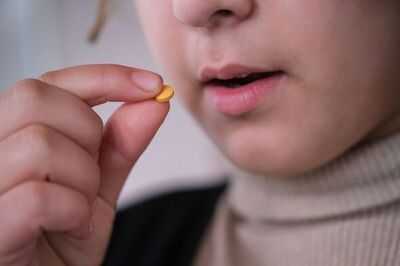
Britain is more dependent on antidepressants than ever before - with prescriptions soaring to record levels since the Covid pandemic.
Official NHS data reveal almost 92.6 million prescriptions were issued in England last year, covering nearly nine million patients - a rise of 15% since 2020, the year before the pandemic hit.
Experts say the figures expose a nation still struggling with the mental health fallout of the pandemic and associated lockdowns, the cost-of-living crisis and NHS backlogs.
Health chiefs admit the "silent epidemic" shows no sign of slowing, as the number of people now identified as needing the drugs has soared by almost 40% in just eight years.
The figures follow a new major analysis in the Lancet which shows the drugs are ineffective for people with less severe forms of depression.
Analysis by addiction treatment group UKAT shows women remain far more likely than men to be prescribed antidepressants, making up around two-thirds of all users.
And the biggest jumps since Covid have been in people in their 30s and 60s, where prescribing has surged by almost a quarter.
UKAT CEO, Daniel Gerrard said: "The post-Covid mental health shock is not fading. In fact, more people are on antidepressants than ever before - and for some groups the rise has been dramatic."

Children are among those increasingly taking the pills. NHS data also shows that between 2023/24, the number of children prescribed mental health medicines rose 9.9 per cent, reaching 120,000. Experts warn the real figure may be even higher once those on repeat prescriptions are counted. Doctors say this reflects the growing mental health crisis among children, as well as gaps in the support available. The surge comes against a backdrop of soaring demand for children's mental health services. NHS data show referrals to mental health support for under-18s with anxiety have more than doubled since before Covid, rising from around 99,000 in 2019/20 to over 204,000 in 2023/24.
Research shows only a quarter of children and young people given antidepressants for the first time had been seen by a child and adolescent psychiatrist first - despite national guidelines saying they should.
Experts say antidepressants can be life-saving for people with severe depression. But studies show they often do little in cases of mild depression, where they may perform no better than a dummy drug. A major study published recently in the Lancet - which analysed 676 high quality antidepressant trials - showed the drugs are ineffective for milder forms of depression.
Side-effects are common and can include weight gain, insomnia, sexual problems and emotional "blunting." Coming off them can trigger withdrawal symptoms such as flu like symptoms, nausea, mood changes and sometimes suicidal thoughts which can last for weeks or months.
Professor Carl Heneghan, Director of Oxford University's Centre of Evidence Based Medicine said: "A large number of people have been medicalised and, as a result, are now taking antidepressants, even though these medications show limited or no effectiveness for mild depression.
"There is now a clear need for a coordinated effort to deprescribe these medications in the community, particularly in cases where the harms outweigh the benefits. Instead, we should focus on implementing psychological and psychosocial treatments that are less harmful and more beneficial for individuals with mild depression."

Professor James Davies, an expert in psychology at Roehampton University, southwest London said: "Vaulting prescribing is not improving the nation's mental health. In fact, there is now compelling evidence that in many ways it may be making it worse at population level due to rising harms and increasing unnecessary use. The crushing truth is that we cannot medicate our way out of the serious social problems, despite what these shocking figures appear to imply."
He added: "We need to pivot away from our over reliance on drugs towards more effective psychological and social provision."
The government drug regulator the National Institute of Clinical Excellence - NICE - guidelines advise that in mild cases, talking therapies, lifestyle changes and social support should be offered before medication.

An NHS spokesperson said: "Events over the past few years have had a negative impact on the nation's mental health and the NHS is now treating amillion more people than before the pandemic, and has significantly expanded support for children throughthe roll out of specialist mental healthsupport to half of England's schools,which will extend to all children in the next five years.
"Antidepressants should beprescribed alongside other support services like NHS talking therapies, which is now seeing over 1.2 million people per year. If you're worried about your mental health, please talk to your GP practice or you can self-refer to talking therapies."
And a spokesperson for the Department of Health and Social Care said: "This government inherited a broken NHS and mental health services suffering from years of neglect.
"We are transforming mental health services with an extra £688 million, hiring 8,500 extra mental health workers, delivering more talking therapies and providing better access to help through the NHS App.
"We are also expanding the rollout of mental health support teams in schools to cover up to a million more pupils in 2025-26, with all schools in England able to access mental health support by 2030."
You may also like

Top Putin allies break ranks with Kremlin on state TV over Ukraine war reality

BREAKING: Rangers sack Russell Martin after four months as managerial decision confirmed

"Aadhaar not proof of birth, residence, or citizenship," says CEC Gyanesh Kumar

Thomas Skinner says 'Amy didn't deserve to be first out' after Strictly elimination

Arsene Wenger's prediction for £6.5m signing proven spot on after Frank Lampard comments







